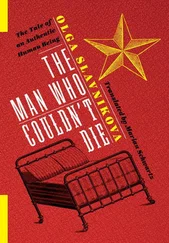I explored it with the palms of my hands, up and down and from side to side, but found nothing. The corridor ended in a solid wall. I was baffled. I turned and began to creep back toward the main passage. I held my hands out and felt the walls either side of me. The corridor was too narrow for the woman to have slipped past me without our touching. Her disappearance defied all logic. Then, I guess about halfway along this tributary of the main corridor, my left hand felt something different. Further investigation revealed there was a door let into the wall. I fumbled around and eventually met the cold metal of a handle. I turned it and pushed the door, which did not yield. It was evidently locked.
Still, at least the puzzle was explained. The woman must have flattened herself into this doorway and stood there while I crept past. That would have been the moment when I paused, sensing her presence close to me. And then, once I had gone by, she had returned silently to the main corridor.
I made my way slowly back to it and had just reached the junction when I heard a sound that made my blood freeze. A terrible distant laugh, my opponent braying her triumph. I knew it was useless to pursue her now, even had I had the nerve and inclination; she was too far off. I experienced a moment of frustration at her having toyed with me so and gotten the better of me, but it was subsumed by relief from the responsibility of pursuing her further. I returned to my room, where I found and lit another candle. I was so jumpy that the hiss of the match and the shadows dancing on the walls startled me. I almost expected the light to reveal the woman standing right in front of me. I had no key with which to lock my door, so took the chair from my desk and set its back beneath the handle. I knew I would do this every night from now on, to prevent another intrusion.
In my nervous state, sleep was out of the question. I picked up Moral Treatment and, without getting undressed, which I knew would make me feel more vulnerable, lay down on my bed and began to read. By the time the first light was stealing around the edges of the window blind, I had finished the book.
Next day, fired up with enthusiasm, I went to breakfast to do battle with Morgan, so convinced by the good reverend’s arguments that I felt sure my employer could not fail to be impressed by them too. While he sat eating his breakfast in a leisurely manner, I used all my experience in making my case, presenting it as if it were the closing defence speech in some courtroom melodrama. From time to time I glanced at him and found him listening attentively, nodding his head now and then, which made me hope I was winning him over to my way of thinking. At last I had presented all my – that is to say Abrahams’s – case and, falling silent, looked at him expectantly.
He sat smiling, and I thought I had carried the day, until I recognised it as the kind of smile one puts on to indulge a small child. At last he spoke. ‘I have to admit I admire your enthusiasm,’ he began, and I felt a glow of pride, but then he added, ‘but I’m afraid it’s misplaced. The ideas you espouse are woefully out of date. These things were tried years ago and proved to be a dismal failure.’ I opened my mouth to protest but he held up a hand to silence me. ‘Oh, I dare say you’ve read some of the claims these people make and no doubt they had a good outcome once in a while, but generally these theories have long been discredited. You see, these people were priests and unqualified do-gooders; they were not medical men. It’s only comparatively recently that we doctors have become involved in the mental health problem. It’s now generally recognised that insanity is not to do with social pressures and personal misfortune, but is a pathological problem. It’s a physical disorder of the brain and, as such, must be managed. It cannot be cured so easily as you and the people who’ve influenced you think. Believe me, I’ve had years of experience and I assure you – who’ve had none – that I know what I’m talking about.’
I protested that surely he must agree that the way the staff at the hospital treated disturbed people could not be helping their condition. Did he not think, I asked, of trying a gentler method?
At that he began to grow angry and his face became red and choleric. ‘How many attendants would we have to have for there to be sufficient of them to spend time chattering with the patients? Who will be playing music for them? Who will be supervising their games? Where is the money to come from to pay for the sumptuous feasts you wish to provide them with?’
We batted the thing back and forth until finally I could see that I was getting nowhere. All I achieved was to increase his ire. Finally, at the end of one of his tirades I decided enough was enough. I hung my head and said nothing. There was an awkward silence. It was Morgan who broke it. He cleared his throat and said, ‘Look, I’m not an unreasonable man and I don’t want to discourage someone who’s just starting out in the profession. Here’s what I’ll do. I’ll give you a chance to prove your ideas can work.’
I looked up. ‘How will you do that?’
‘I’ll indulge you this far: you may take one patient, any patient you like, so long as it’s not one of the violent ones. And you can treat her according to your notions. Separate her from the rest, give her different clothes, she can eat what the staff eat. She can have her own interests, although she’ll only have you to play cards with or else she’ll have to make do with solitaire.’
I was almost too stunned to speak. ‘Y-you’re serious?’ I said at last.
‘Completely.’
‘Then thank you, sir.’ I was grinning like a fool. ‘That’s incredibly generous of you. I truly appreciate the opportunity.’
‘I should think so,’ he said, picking up his coffee cup and taking a sip. He set it down and beamed at me. ‘It’s the chance to find out for yourself how wrong you are.’ He began to rise from the table, even though I’d been so busy talking I’d had no time to eat anything. ‘This afternoon you can select your guinea pig.’
Morgan strode along the day room, gesturing expansively with his arms at the wretches ringed around it. ‘There you are, take your pick. Select one on whom to practise your experiment. Anyone you like, it’s up to you.’ He stood still, fingers in his vest pockets, smiling broadly, rocking back and forth on his heels, a poker player smug with a winning hand and enjoying himself immensely.
I looked at the sea of faces; many were muttering to themselves, others gazed into space, or dozed with their eyes closed, or fiddled with their fingers, or picked invisible bugs from their clothes, regarding their actions with intense fascination. Here and there I would find a woman staring at me, sometimes eagerly, as if she required only the merest nod from me to engage me in conversation, or, more often, fearfully, as though she thought I was about to whisk her off for a long cold bath or an afternoon tied to a chair.
I was at a loss. It was impossible to decide on one poor imbecile over another. The important thing was to select someone who would give me the greatest chance of success. Why, exactly, I could not have told you. For what reason was I allowing myself to become involved in this? What good could it possibly do me? It would not help my situation to antagonise Morgan, and yet I knew this was part of my motive. I could not endorse the man’s bullish certainty that what he was doing was right. But another cause for acting as I did was that I was a professional and that this was what my part demanded of me. A man who has a book on Moral Treatment in his baggage and who puts its theories into a letter of application for employment, boldly it has to be said, given it obviously went against the current prevailing wind in the treatment of mental illness, would be bound to take Morgan on.
Читать дальше












